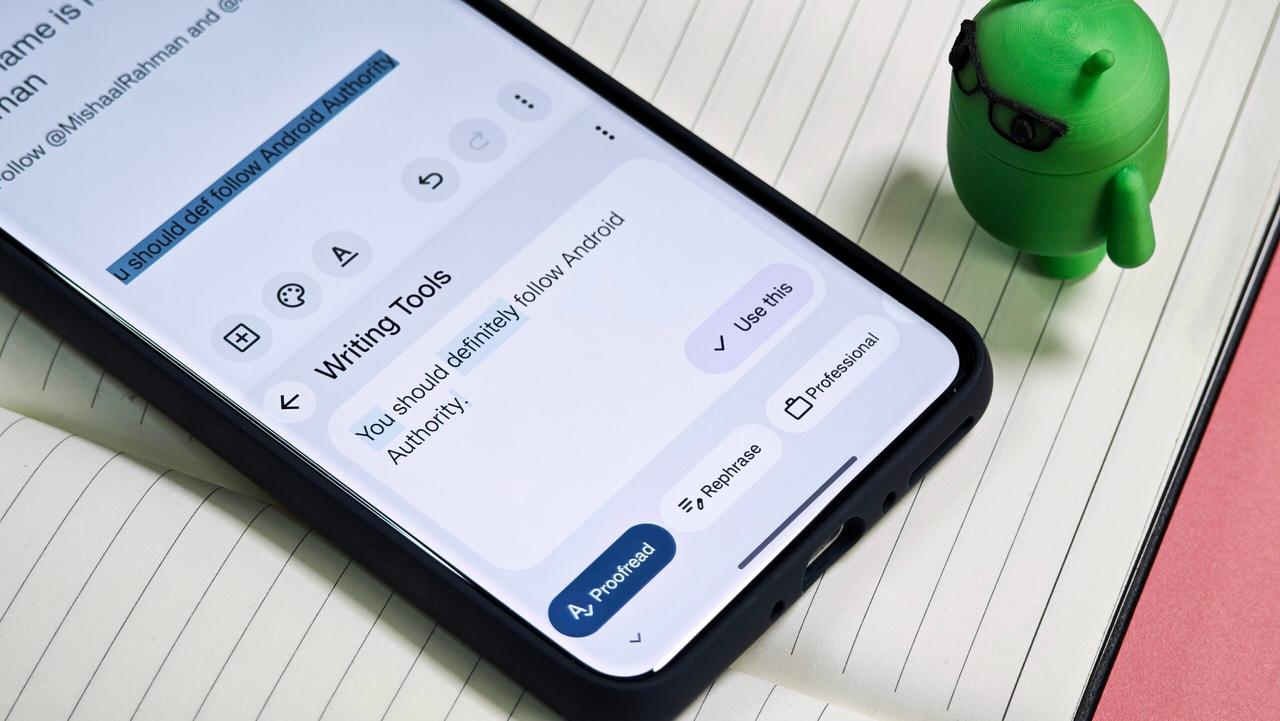Android 16 to Introduce Feature for Disabling AI Writing Tools in Specific Apps
3 Sources
3 Sources
[1]
Android 16 could fix one of the most annoying things about AI tools
Don't like AI interfering with your writing? Android 16 could help out If you dislike writing, or find that you're generally not very good at it, then you';re probably quite happy about the recent wave of AI writing tools. But for all those times when you want to be able to write authentically, and without machine assistance, Android 16 might be able to step in and help. According to Mishaal Rahman, who has been snooping through Android 16 developer preview 2, there appear to be two new features in the EditorInfo class related to Android's AI writing tools -- isWritingToolsEnabled() and setWritingToolsEnabled(). For those that don't know, the EditorInfo class is the link between keyboards and apps, letting the two share information about what's in text fields. isWritingToolsEnabled() is the check Android does to see if AI-writing tools are switched on for a specific app or text editor. AI tools are switched on by default, but the setWritingTooldEnabled() is what lets apps opt out of those same AI writing tools, and in the process keep control of what's written in the hands of you and the app itself. As Rahman notes, most apps don't have any reason to opt out of Ai writing tools "in most text fields". But some may still want to keep AI from altering text in certain circumstances. Rahman speculates that this could include fields for email addresses, passwords and phone numbers. Gboard already does this, but the tools could be Google's way of trying to better enforce that across third-party keyboards as well. Or at least ensuring developers have the ability to get it done. I suspect this tool may also be utilized in cases where apps don't want any AI interference. If there are camera apps out there that market themselves as being AI-free, then I would bet money on word-processing and note-taking apps doing the same thing. Or, alternatively, it could be a specific setting inside an existing app -- to accommodate the people who don't need or want writing help from AI. We'll just have to see what Android 16 brings us when it launches next year, and how developers are going to utilize this particular feature.
[2]
Android 16 could let apps turn off AI writing help
Android 16 makes the Pixel 9's ultrasonic fingerprint sensor even easier to use Summary Android 16 might let you turn off AI help for more control over your writing. New EditorInfo features in Android 16 are said to allow apps and keyboards to share info about text fields, like what you're typing, so the keyboard adjusts accordingly. A class called isWritingToolsEnabled() checks if AI writing tools are on for a text editor, and setWritingToolsEnabled() lets apps turn off AI text rewriting when it's not needed (like in password or number fields). ✕ Remove Ads Traditional spelling and grammar checks usually make you stop and fix mistakes manually, which can slow down your writing -- especially when you're typing quickly. AI-powered tools like those in Gboard have made things easier, but sometimes they're not needed or wanted. When you don't need AI jumping in, Android 16's new tool might come in handy, letting you turn it off and giving you more control over your writing. Related Gboard's new Proofread AI is here to fix your sloppy writing This beta update promises to take autocorrect to the next level Posts While checking out the Android 16 Developer Preview 2, Mishaal Rahman over at Android Authority found two new features in the EditorInfo class: isWritingToolsEnabled() and setWritingToolsEnabled(). This class is like a messenger between apps and keyboards, letting them share important information about text fields, like what kind of content you're typing, so the keyboard can adjust accordingly. ✕ Remove Ads The isWritingToolsEnabled() method checks if AI-powered writing tools are turned on for a specific text editor. By default, these tools are enabled for all text fields, but you can turn them off in situations where they don't make sense, like for password or number fields. The new setWritingToolsEnabled() method lets apps choose to opt out of AI text rewriting, giving them more control over how writing assistance works. Most apps won't need to turn off AI writing tools for regular text fields. For example, when typing an email, text, or document on your phone, it's easy to struggle with getting your thoughts out. While tools like ChatGPT can help, having AI built right into your keyboard makes the whole process smoother and faster. Some apps might want to keep AI out of certain text boxes However, some apps might need to turn off AI writing tools in certain situations. For instance, using AI to replace text wouldn't make sense in fields for email addresses, passwords, or phone numbers, as noted by Rahman. ✕ Remove Ads Unlike Gboard, some of the leading keyboard apps might not hide unnecessary options in numeric or password fields. That's where the new Writing Tools API comes in, making sure this behavior is the same across different keyboards. Still, even if apps follow the API, it's easy to get around them. You could just type your text in another app and paste it into the field, bypassing the restrictions.
[3]
Android 16 will let apps block AI writing tools
Apps might want to disable AI writing tools when the user is inputting text in certain text fields like for emails. Google rolled out the second developer preview of Android 16 the other day, bringing the platform a whole host of new developer features like better app control over haptics, search support for cloud media items in the photo picker, an adaptive refresh rate API, and more. As usual, it also includes changes that Google didn't highlight in its announcement, some of which we've already covered. The latest change we've spotted is a new Writing Tools API that seemingly lets apps opt out of having AI rewrite text for you.
Share
Share
Copy Link
Android 16's upcoming release may include a new feature allowing apps to disable AI writing assistance in certain text fields, giving users and developers more control over text input.

Android 16 to Introduce New Writing Tools API
Google's upcoming Android 16 release is set to introduce a new feature that could significantly change how AI writing tools function within apps. The second developer preview of Android 16 has revealed a new Writing Tools API that will allow apps to disable AI-powered text rewriting in specific scenarios
1
.The New EditorInfo Class Features
Mishaal Rahman, a tech expert who has been analyzing the Android 16 developer preview 2, discovered two new features in the EditorInfo class: isWritingToolsEnabled() and setWritingToolsEnabled()
2
. These features are designed to give apps more control over when and where AI writing assistance is applied.How the New API Works
The isWritingToolsEnabled() method checks if AI-powered writing tools are enabled for a specific text editor. By default, these tools are enabled for all text fields. The setWritingToolsEnabled() method allows apps to opt out of AI text rewriting, giving developers the ability to disable this feature when it's not needed or desired
3
.Potential Applications
While most apps may not need to turn off AI writing tools for regular text fields, there are scenarios where this feature could be beneficial:
-
Security: Fields for email addresses, passwords, and phone numbers could benefit from disabling AI assistance to prevent unintended alterations
2
. -
Specialized Apps: Word-processing or note-taking apps that market themselves as AI-free could utilize this feature to maintain their unique selling point
3
. -
User Preference: Apps could offer a setting to accommodate users who prefer to write without AI assistance
3
.
Related Stories
Implications for Third-Party Keyboards
Google's introduction of this API could be an attempt to better enforce consistent behavior across third-party keyboards. While Gboard already implements similar functionality, this new feature could ensure that all keyboard apps adhere to the same standards when it comes to AI writing assistance
3
.The Balance Between AI Assistance and User Control
The introduction of this feature highlights the ongoing debate about the role of AI in writing and communication. While AI-powered tools like those in Gboard have made typing easier and more efficient, there's a growing recognition that users should have the option to write without machine assistance when desired
1
.As Android 16 is still in its developer preview stage, it remains to be seen how app developers will implement this new feature and how it will impact the user experience when the operating system launches next year
3
. This development represents another step in the evolving relationship between AI technology and user autonomy in mobile operating systems.References
Summarized by
Navi
[2]
[3]
Related Stories
Google's Gboard Writing Tools Expands to Pixel 8 Pro, Signaling Broader AI Feature Rollout
17 Sept 2025•Technology

Google Pixel 10's Gboard Introduces AI-Powered Writing Tools and Voice Commands
21 Aug 2025•Technology

Google Unveils Android 16: A New Era of Design, AI Integration, and Enhanced Security
14 May 2025•Technology

Recent Highlights
1
Pentagon threatens to cut Anthropic's $200M contract over AI safety restrictions in military ops
Policy and Regulation

2
ByteDance's Seedance 2.0 AI video generator triggers copyright infringement battle with Hollywood
Policy and Regulation

3
OpenAI closes in on $100 billion funding round with $850 billion valuation as spending plans shift
Business and Economy





